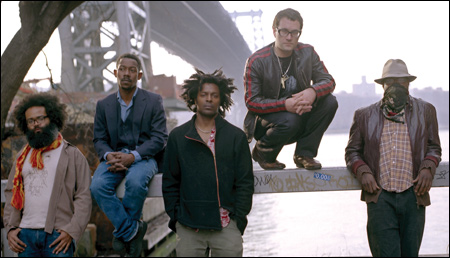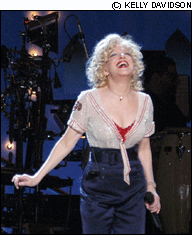England’s Sharks bring “The Joys of Living” to the US
By The Burg Staff on Apr. 27, 2011By MATT ASHARE
 |
| “It’s very sarcastic, isn’t it, punk?," says Sharks singer James Matlock |
Prior to that, Alternative Press featured Sharks in its “100 Bands You Need to Know in 2011.” And, in less than 24 hours, Matlock and his bandmates — guitarist Andy Bayliss, bassist Cris O’Reilly and drummer Samuel Lister — are headed to the U.S., where they’ll begin their first American tour with a monthlong stint opening for Social Distortion. (They’ll be at the NorVa in Norfolk on May 17 and the National in Richmond the following night.)
To judge from sentiments expressed in his lyrics, Matlock may also be more than a little relieved to have found a ticket out of Coventry. “How pathetic this must sound/To a hope of finally getting out/To someone who doesn’t even know/He’s bored of this town,” he screams a cappella into a dark void at the start of “Trains,” a sneering Clash city rocker that takes a vividly poetic turn on the refrain “Another night arrives/Slice open your eyes/Dream between the lines.” Matlock’s “bored” again in the serrated sing-along “Three Houses,” which coalesces around an insolent yet romantic chorus of “Travels underground make time for other things/including dust settling shackles to be broken free.” And in the pounding “Glove In Hand,” a sly homage to the Smiths (and their song “Hand In Glove”), Matlock growls “I can’t believe I’m jailed in neighborhood/I can’t believe I lived to stomach it” before an atmospheric and dreamy break in the guitar distortion opens and he intones, “I engage to take on every passing day with true hate.”
“I’ve always lived around here,” says Matlock, who started Sharks with Bayliss when the two were in high school. “When I was growing up I was with different parts of my family. My parents left and I was in Coventry with my grandparents. That was a little rough and emotionally confusing. But really the town I live in is nice. It’s just a bit dull. There’s nothing to do. Boredom is the main incentive behind the band. If we weren’t in a band I have no idea what I’d be doing.”
Punk’s been a potent outlet for teen angst for at least three decades, and Matlock was a quick study. “I can’t name any punk bands who were active when we got started, apart from the British bands who are still going from back in the day,” he admits. “I got into it from digging up old records. It was more of an American thing that I discovered from bands like Green Day and Rancid. Then I dug deeper and found their influences and I got my head around the history of the big punk family tree.”
The Joys of Living is more than the sum of those borrowed parts. There’s precocious promise reflected in the philosophical premise of the disc’s title track, the wistful tenor of “More Blue,” and the sardonic humor of “The Light At the End of the Tunnel Is Hell.”
As Matlock concludes, “It’s very sarcastic, isn’t it, punk? It’s satirical. A lot of our lyrics are quite dark, but we don’t want to take it too seriously. After all, we’re just a band, aren’t we?” http://www.the-burg.com/blogit/entry/englands_sharks_bring_the_joys_of_living_to_the_us
Ashare, a freelance writer based in Lynchburg, is a former music editor for The Boston Phoenix.






